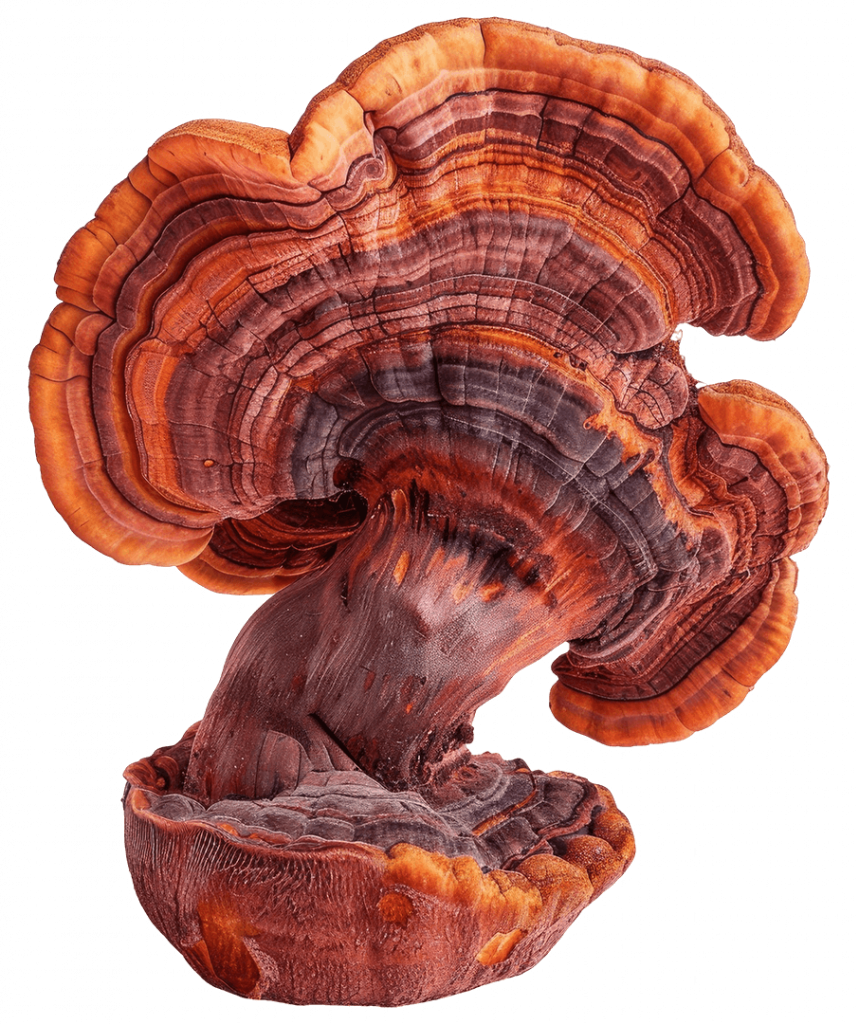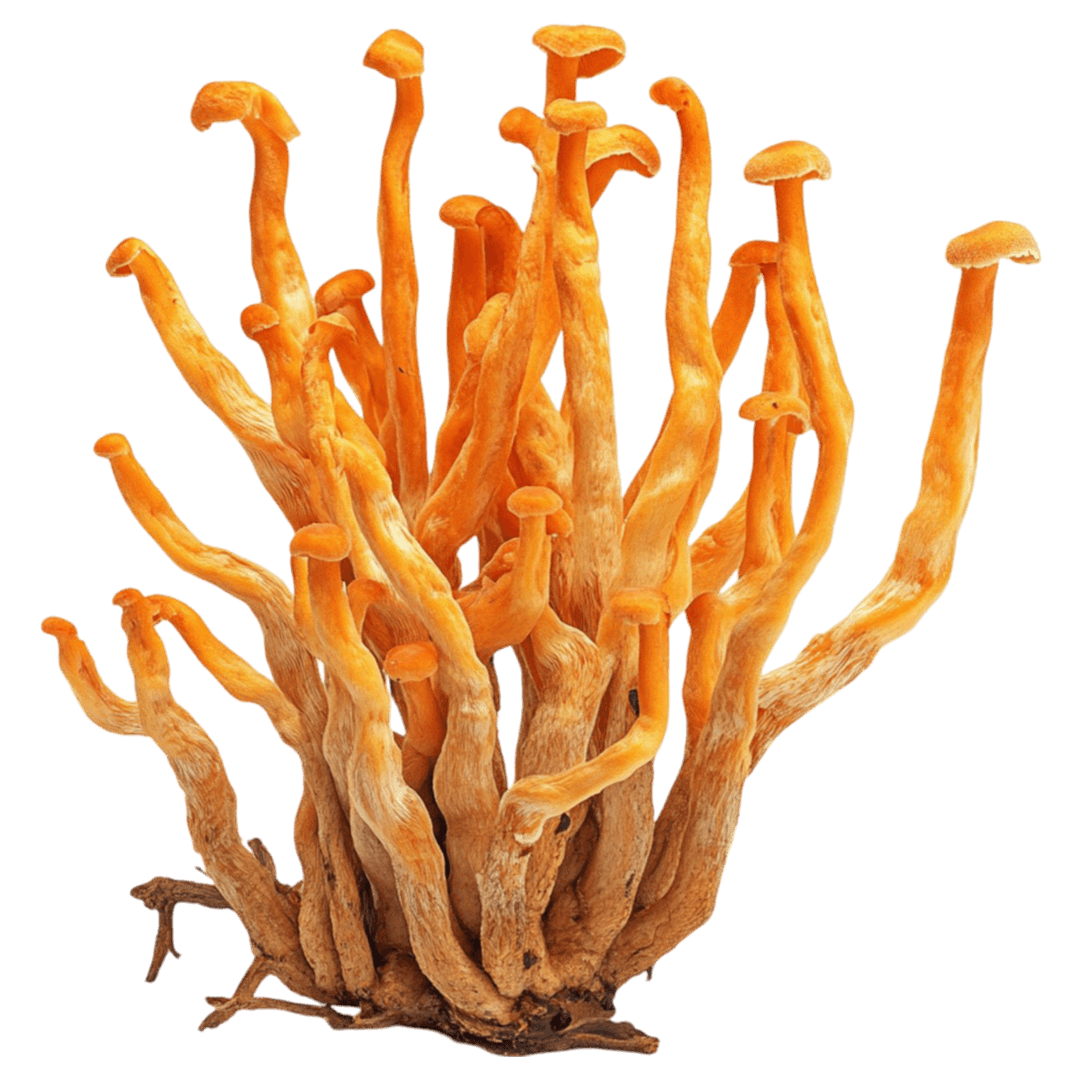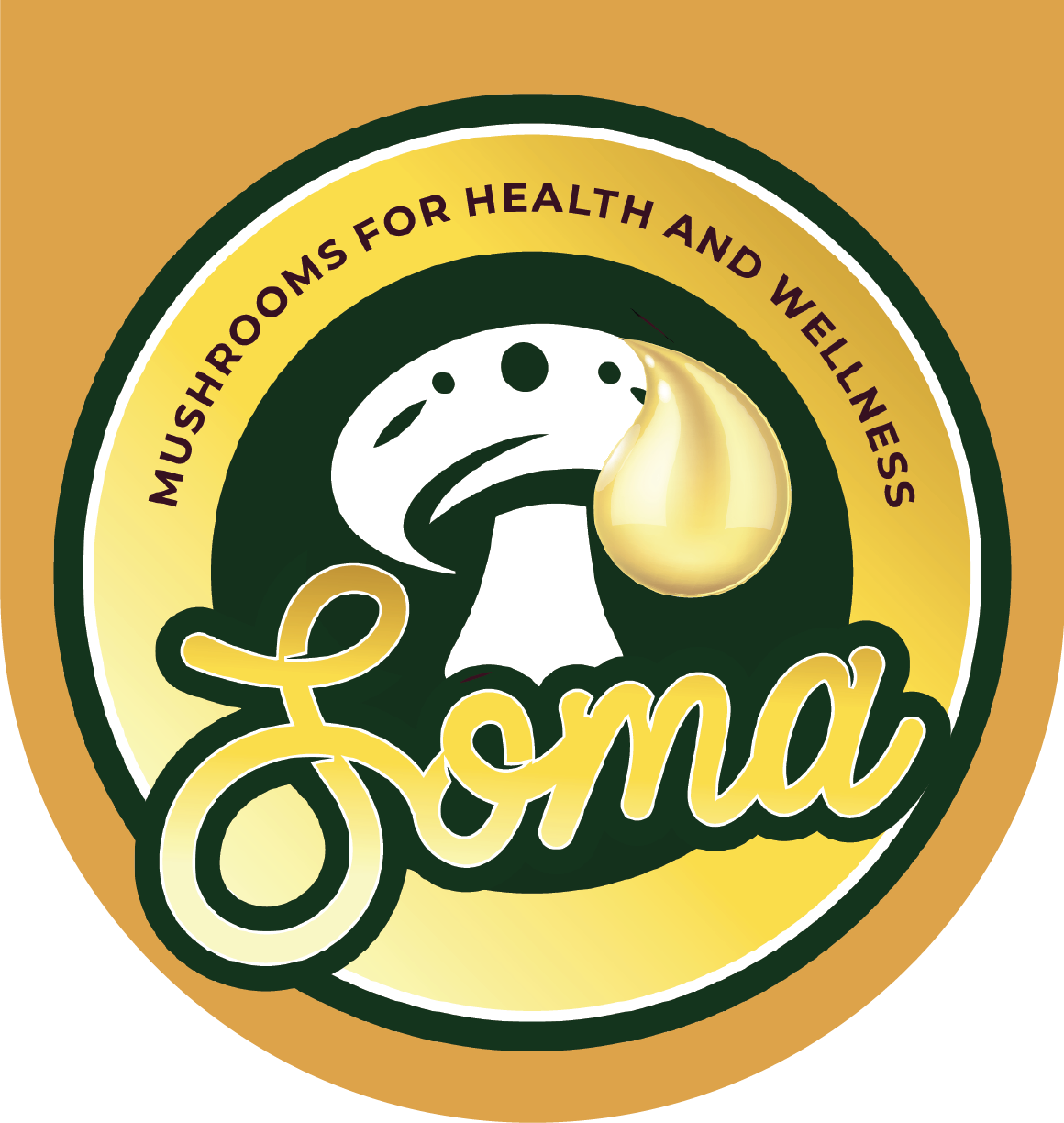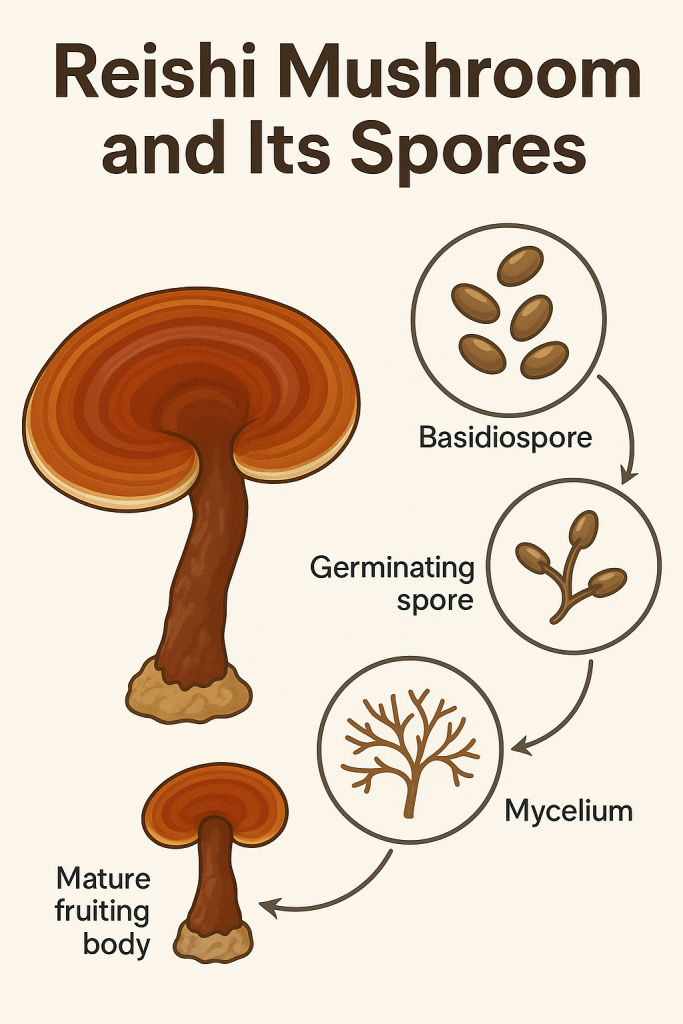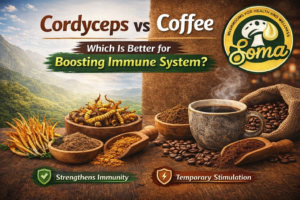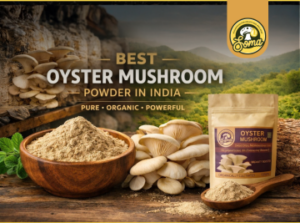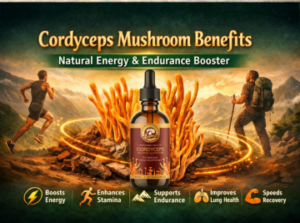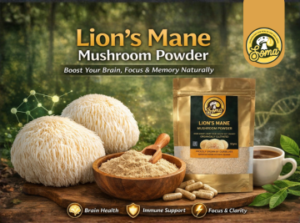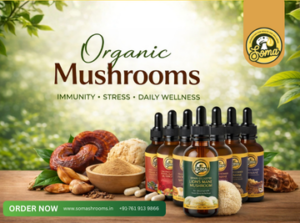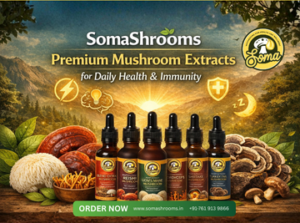Introduction
Reishi (Ganoderma lucidum), often called the “Mushroom of Immortality,” is one of the oldest and most respected medicinal mushrooms in the world. In different cultures, it is known as Lingzhi (靈芝) in China, Reishi in Japan, and sometimes referred to as Rashi in common usage.Unlike edible mushrooms such as button or oyster mushrooms, Reishi is woody, bitter, and not typically consumed as food. Instead, it is used in the form of teas, extracts, capsules, and powders. Its unique glossy, reddish-brown appearance growing on decaying wood makes it instantly recognizable.
What truly makes Reishi special is its rich composition of bioactive compounds – including polysaccharides, triterpenoids, sterols, proteins, and phenolic compounds – each contributing to health benefits ranging from immune system support to stress reduction and anti-aging properties.
For over 2,000 years, Reishi has held a sacred place in Traditional Chinese Medicine (TCM), where it was reserved for emperors, monks, and healers seeking vitality, spiritual strength, and longevity. Modern science has now validated many of these ancient beliefs, identifying Reishi as a powerful adaptogen, immunomodulator, and antioxidant.Today, Reishi is embraced worldwide as a superfood and natural health supplement, bridging the gap between ancient wisdom and modern biotechnology.
Key Bioactive Compounds
Reishi’s therapeutic effects are rooted in its diverse bioactive profile:
Key BioPolysaccharides & β-Glucansactive Compounds
Stimulate immune cells (macrophages, NK cells, dendritic cells).
Enhance cytokine production (IL-2, TNF-α).
Clinical effects: improve infection resistance, reduce fatigue, regulate blood sugar, and enhance immunity in cancer patients.
Triterpenes (Ganoderic Acids)
Over 140 unique lanostane-type compounds.
Anti-inflammatory: inhibit NF-κB, reduce IL-6 & TNF-α.
Hepatoprotective: lower ALT/AST liver enzymes.
Cardiovascular: regulate blood pressure, reduce cholesterol.
Anti-cancer: induce apoptosis, inhibit tumor angiogenesis.
Other Compounds
Phenolics & Sterols: antioxidants, cardiovascular support.
Proteins (e.g., LZ-8): stimulate T-cell proliferation.

Timeline of Clinical Benefits
Reishi is not a “quick fix.” Its effects build gradually, supported by clinical trials:
- Weeks 2–4: Better sleep, reduced stress & fatigue, improved mood.
- Weeks 6–8: Enhanced immunity, improved liver enzyme markers, reduced inflammation.
- 12+ Weeks: Lowered LDL cholesterol & blood pressure, anti-aging effects, supportive therapy in cancer treatment
Key Bioactive CompounHealth Benefits of Reishi Mushroomds
For centuries, Reishi has been treasured not just as a symbol of longevity but also as a natural remedy for a wide range of health concerns. Modern science now supports many of these traditional claims. Here are some of the most powerful benefits of Reishi mushroom:
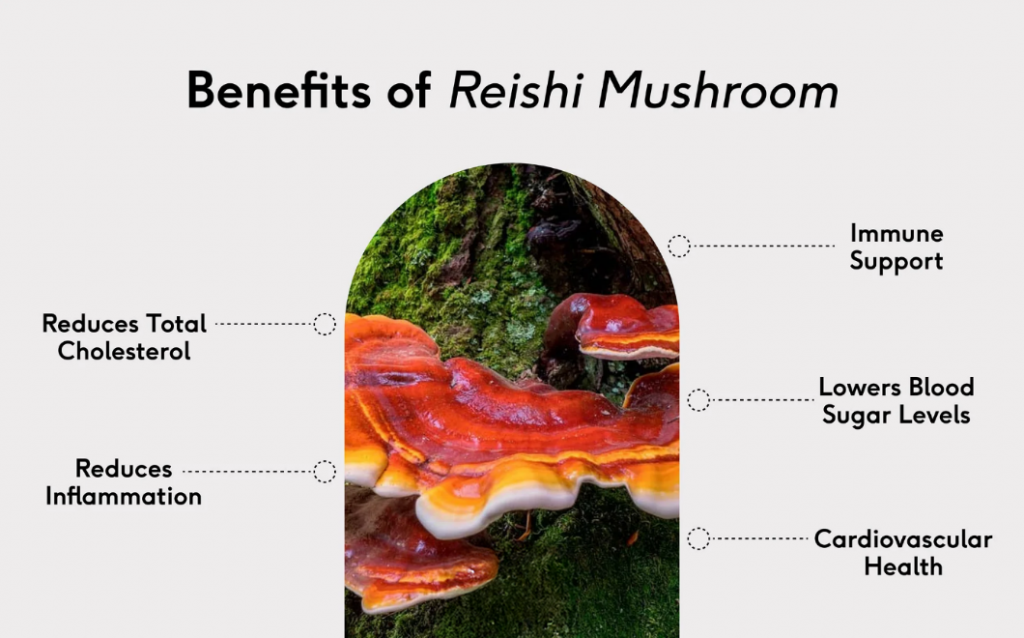
Anti-Cancer Potential
Reishi contains polysaccharides and triterpenoids that help stimulate the immune system, making it more effective at recognizing and destroying abnormal cells. Research suggests it may inhibit tumor growth and prevent metastasis by inducing apoptosis (natural cell death in cancer cells). While it is not a replacement for conventional treatments, Reishi is increasingly studied as a supportive therapy in cancer care.
Triterpenes (GanodeCardiovascular Health
ric Acids)
One of Reishi’s remarkable benefits lies in heart health. It helps in:
- Regulating blood pressure.
- Reducing “bad” LDL cholesterol.
- Improving blood circulation.
These effects make it a natural aid for people managing hypertension, high cholesterol, or poor circulation.
Liver Protection
The liver is our body’s detox powerhouse, and Reishi helps keep it strong. Its bioactive compounds support detoxification processes, reduce oxidative stress, and show promising effects in managing hepatitis and fatty liver disease. Regular use may contribute to overall liver resilience and repair.
Anti-Inflammatory Properties
Anti-Inflammatory Properties Chronic inflammation is at the root of many diseases, from arthritis to autoimmune conditions. Reishi’s triterpenoids and polysaccharides act as natural anti-inflammatories, calming the immune system when it’s overactive. This makes it valuable for conditions like allergies, asthma, arthritis, and chronic inflammatory disorders.
Stress & Sleep Aid
Reishi is also recognized as a powerful adaptogen – a natural substance that helps the body adapt to stress. It:
Reduces fatigue and exhaustion.
Balances stress hormones.
Supports deeper, more restful sleep.
Who Should Use Reishi Mushroom?
Reishi, once known as the “Elixir of Life” for emperors and monks, is now a natural supplement that can benefit people across different lifestyles. Its wide range of bioactive compounds makes it useful for immunity, stress relief, vitality, and long-term health support. Let’s look at who can benefit most:
Immunity Seekers
If you’re someone who catches colds, flu, or infections easily, Reishi can help.
Its β-glucans (polysaccharides) stimulate immune cells like macrophages and NK cells, making the body more efficient at fighting off pathogens.
Ideal for people with weaker immune systems, frequent travelers, or those in polluted environments where the immune system is under constant stress.
Stress Relief & Better Sleep
Reishi acts as an adaptogen, helping the body adapt to both mental and physical stress.
It supports the regulation of cortisol (the stress hormone), reduces anxiety, and promotes calmness.
Studies show Reishi may also improve sleep quality, making it valuable for people with insomnia, overthinking, or chronic fatigue.
Perfect for students, working professionals, and anyone struggling with burnout.
Wellness Enthusiasts & Healthy Aging
For those who want to maintain youthful energy, clear skin, and long-term vitality, Reishi is a natural ally.
Its antioxidants and phenolic compounds fight oxidative stress — one of the biggest causes of aging and cellular damage.
Athletes and fitness lovers also use it for better endurance, recovery, and stamina.
Cancer Patients (Supportive Therapy)
Reishi is not a cure, but studies suggest it can be useful as a complementary therapy in cancer care.
It may enhance immune response, reduce chemotherapy side effects like fatigue, and improve overall quality of life.
It works by stimulating immunity and promoting apoptosis (natural cell death in abnormal cells).
⚠️ Always consult with a doctor before using Reishi in cancer treatment.
Who Should Be Careful?
While Reishi is generally safe, some groups should avoid or take extra caution:
| Pregnant or breastfeeding women | safety is not well studied. |
| People on blood thinners or blood pressure medication | Reishi may interact with these. |
| Those with mushroom allergies | could trigger allergic reactions. |
| People with scheduled surgery | should stop Reishi use at least 2 weeks before due to its effect on blood clotting. |
Conclusion: Bringing Reishi into Daily Life
Reishi mushroom is more than just an ancient remedy – it’s a modern superfood for daily wellness. From boosting immunity to calming stress, its benefits are most effective when used consistently in simple, everyday routines.
| Morning boost | Start your day with Reishi tea or coffee blends for calm focus. |
| Daily supplement | Capsules or powders can be added to smoothies, shakes, or just warm water. |
| Night ritual | A cup of Reishi tea before bed helps promote deep, restful sleep. |
By respecting the sensitive nature of its compounds (store in a cool, dark place and choose high-quality extracts), Reishi becomes an easy addition to modern life. Whether you’re looking for stronger immunity, better sleep, or long-term vitality, Reishi offers a natural path to balance in everyday living
SOURCES: Publications as below:
Overview of Ganoderma lucidum’s pharmacology, triterpenes, and polysaccharides
Ganoderma lucidum (Herbal Medicine Overview) NCBI
Study demonstrating benefits of spore powder after breaking the tough outer wall
Sporoderm-broken spore powder of Ganoderma lucidum (SSPL) PMC
Research identifying bioactive triterpenes isolated from spores
Triterpenoids from the spores of Ganoderma lucidum PMC
Comparative study of different spore processing techniques and their bioactivity
Sporoderm-removed spores polysaccharide study Frontiers
Clinical evaluation of spore oil’s higher triterpenoid content compared to powder
Clinical Evaluation of Ganoderma lucidum Spore Oil (GLSO) MDPI
Overview of spore oil and its extraction via supercritical CO₂
Bioactive components, pharmacological properties… ScienceDirect
Reputable clinical resource summarizing uses, interactions, and safety considerations
Reishi Mushroom (MSKCC) Memorial Sloan Kettering Cancer CenterLay-friendly overview of Reishi’s potential benefits and need for more research
What Happens to Your Body When You Eat Reishi Mushrooms (EatingWell)
